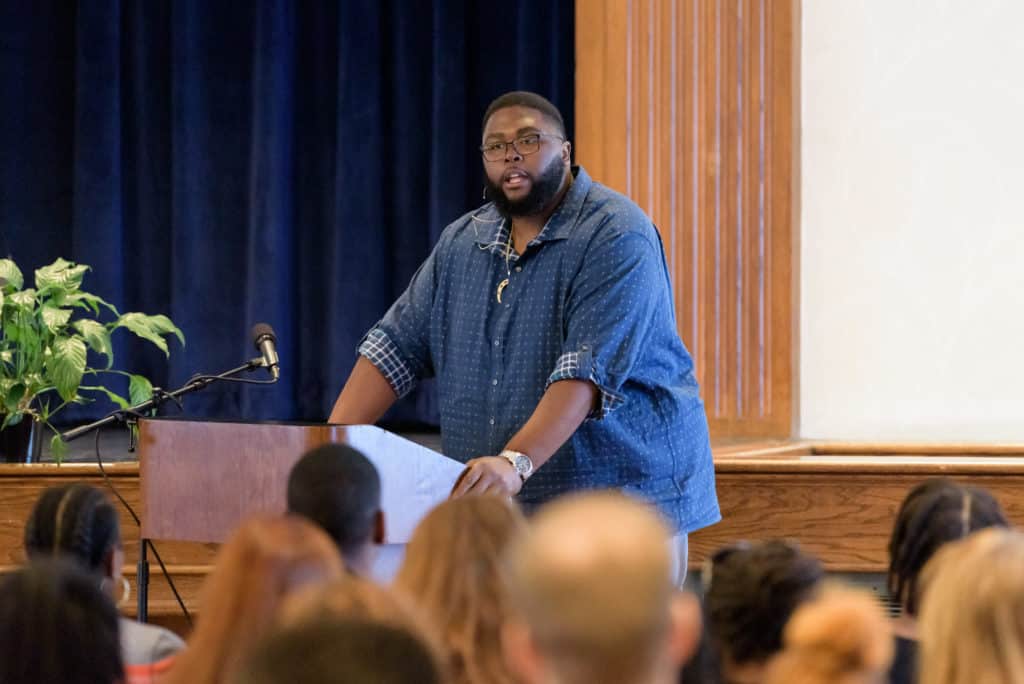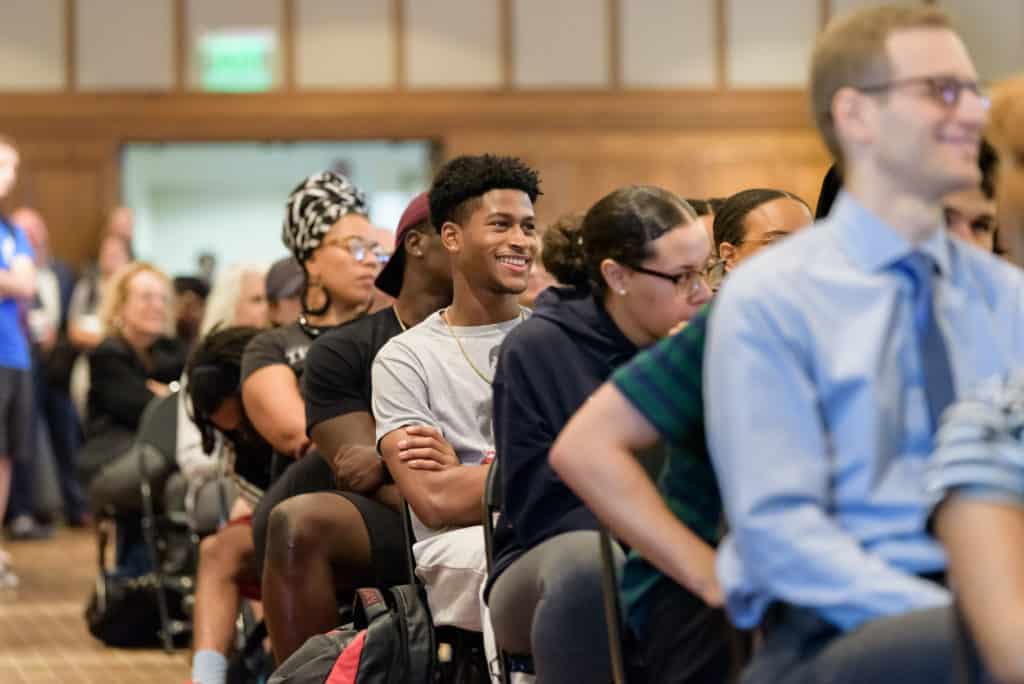Trinity Hosts Talk by Author Highlighting Differences between Access and Inclusion in Higher Education
Trinity College students, faculty, and staff gathered in the Washington Room during Common Hour on September 26 to hear author Anthony Jack, an assistant professor of education at the Harvard Graduate School of Education, share his research in a talk titled, “On Diversity: Access Ain’t Inclusion.” Jack discussed how elite colleges admit but do not necessarily provide enough support for disadvantaged students throughout their four-year collegiate experience.
Trinity was one of the first stops in Jack’s tour for his book, The Privileged Poor: How Elite Colleges are Failing Disadvantaged Students. Drawing upon student narratives and his own experience, Jack’s book serves as a call to action for universities to support students beyond their academic needs. In his talk and in his recent piece published in The New York Times Magazine, Jack shared first-hand stories about what it was like to be academically prepared yet socially and culturally unprepared for what he called the “hidden curriculum” at elite colleges. “Colleges must move from access to inclusion,” Jack said. “We must question what we take for granted.”

Jack grew up outside of Miami and received a scholarship to attend Gulliver Schools, a private college preparatory school in south Florida. He then went on to receive a bachelor’s degree from Amherst College and a master’s degree and Ph.D. in sociology from Harvard University. Within his presentation, Jack defined two subgroups of disadvantaged students: the “privileged poor” and the “doubly disadvantaged.” The “privileged poor” are students from low-income, diverse backgrounds who attended elite prep or boarding schools before attending college. The “doubly disadvantaged” are students who arrived from under-privileged backgrounds without prep or boarding schools to ameliorate their transition.
Maintaining academic success is not the problem for these students, Jack said, but students often find it difficult to interact with their peers due to opposing societal norms and structural inequalities: “‘Dominant cultural capital’ is the ‘taken for granted’ ways of being that are valued within a particular environment.” Jack said students gain cultural capital through admission to elite colleges, making these institutions a springboard for students. However, Jack added that these students will not succeed unless policies and programs are put in place by colleges to make students feel protected, comfortable, understood, and supported.
 Erick Peña ’20, an urban studies major with minors in legal studies and Latin American studies, reflected on how Jack’s call to action could apply to Trinity. “First, the college should uphold and work toward creating an environment in which all low-income students can thrive socially and academically … Second, students should feel comfortable as included members of the college,” Peña said.
Erick Peña ’20, an urban studies major with minors in legal studies and Latin American studies, reflected on how Jack’s call to action could apply to Trinity. “First, the college should uphold and work toward creating an environment in which all low-income students can thrive socially and academically … Second, students should feel comfortable as included members of the college,” Peña said.
Helping to address these and many similar goals at Trinity is Anita Davis, the vice president for diversity, equity, and inclusion (DEI). “Over the past four months, more than 800 members of our community have participated in a range of experiences intended to increase intercultural knowledge and competence,” Davis said. These have included a workshop on inclusive teaching and advising for faculty and workshops on intercultural knowledge and competence for staff members and student leaders. Additionally, the college has implemented a required online course, “DiversityEdu: Social Skills for a Diverse Campus,” for all incoming students. “Throughout this academic year, the Office of Diversity, Equity, and Inclusion will continue to collaborate with campus partners on initiatives that will support Trinity’s commitment to creating a campus where all feel welcome and have the resources they need to thrive,” Davis added.
In addition to the resources offered by DEI, Trinity students may also turn to many other offices, academic departments, and programs across campus for support. Emma Alpaugh ’22 said, “I think that resources that are helpful right now are things like the Center for Student Success and Career Development and specific professors holding office hours and being available to meet and answer questions.”
In an op-ed published recently in the Hartford Courant, “How Trinity College is creating an inclusive future,” Trinity College President Joanne Berger-Sweeney pointed to several ways in which the college is working to attract and nurture students from diverse backgrounds, including “going test-optional, removing barriers to application for first-generation college students, and investing more heavily in financial aid.” Berger-Sweeney added, “At the same time, we know that simply opening the doors of our elite institutions to those from all backgrounds isn’t enough.” She explained that Trinity is operating with many of the best practices to support disadvantaged students in the ways that Jack suggested, such as holding orientations designed specifically for first-generation students and providing food options for students during college breaks, when the risk of food insecurity can be higher. Berger-Sweeney called Jack’s visit “a reminder to keep striving … to provide an even better and more inclusive experience.”
At the end of his talk, Jack encouraged students to hold colleges to high standards and to never change who they are. He said, “Be unapologetic, be bold, and be you.”
